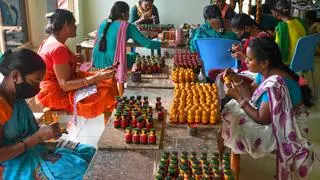It’s the title that caught my eye from my alma mater Harvard University’s school of public health on how local and state governments were banning the sale of plastic baby bottles having traces of the chemical bisphenol A (BPA). I was baby-sitting my three-year-old granddaughter and in my hand was her daily milk bottle made with an attractive looking plastic.
For many years, the US FDA had maintained that there was a lack of human data to show that BPA poses health problems. In January 2010, the FDA reversed its opinion saying they now have concerns about health risks. The threat that plastic bottles cause health risks seems real, says Russ Hauser a professor of public health and an expert in environmental epidemiology. Associate professor Karin Michaels says, “The nightmare scenario is that one day we find out that many disorders like infertility and cancer may be due to toxins leaching from plastics e.g. bisphenol A, and it may be too late to reverse the side effects. Used for more than 50 years to manufacture polycarbonate plastic for use in the food and medicine industry, a synthetic hormone BPA mimics the female hormone estrogen.”
Too much exposureThe plastics family of phthalates is also a concern. Phthalates are endocrine disruptors, chemicals that enter the blood. They inhibit androgens and affect males more than females. Researchers say that pregnant women, foetuses and new-born children are most vulnerable to these pervasive chemicals. Even breast milk can be concentrated and may be detected in their infants’ urine. New York State banned baby bottles containing BPA which was followed by other states. Canada declared BPA a dangerous substance and banned it in baby bottles. Regulators across the globe said that the concern was exposure of young children to high levels of this chemical. New studies show that BPA exposure affects the maturation of the human oocyte.
In India, plastic bottles are everywhere, from milk bottles to medicine and water too. Some well-known products packaged in PET bottles were sent by an NGO to the National Test House, a government test house in Kolkata.
Milk bottles, medicine bottles, and juice bottles were tested and significant heavy metal and phthalate leaching well above the acceptable norms was noticed. The leaching increased dramatically when temperatures rose to 60 degrees.
For instance, NTH data shows that Benadryl stored at 40 degrees C in plastic bottles contains antimony, lead, cadmium, chromium and DEHP, all well above the safety limits. The same was found in the case of carbonated beverages, and even fruit drinks in Tetra Paks ( for more data, see table online ).
Banning’s goodI do support the decision of the Union Government late last year to ban plastic packaging for certain pharmaceutical products for a vulnerable section of our society, namely paediatric, geriatric, pregnant women and women in the reproductive age.
The government must also ban plastic baby bottles, and milk bottles must be made of glass . The good, old-fashioned glass bottle must see a comeback. Medicines are critical, too. The patient hardly needs a load of toxic heavy metals such as lead, antimony and cadmium or chromium. DEHP is a known endocrine disruptor and there is a growing body of evidence that certain phthalates, including DEHP, are implicated in causing breast cancer, testicular cancer, birth malformations in baby boys, and infertility.
Given that DEHP can act as a hormone disruptor, it is likely that there is no safe level of exposure. Moreover, this chemical is a suspected carcinogen and neuro, immune toxicant and is associated with neuro-developmental disorders in children. Juices and beverages, particularly for teenagers who will be the future citizens of the country, must also be in the safest glass-packaging materials for human health. Our family has changed from plastic milk bottles. We should not ignore the danger present all around us.
The writer has worked over three decades in the field of public health. She is vice-chairperson of Piramal Enterprises







Comments
Comments have to be in English, and in full sentences. They cannot be abusive or personal. Please abide by our community guidelines for posting your comments.
We have migrated to a new commenting platform. If you are already a registered user of TheHindu Businessline and logged in, you may continue to engage with our articles. If you do not have an account please register and login to post comments. Users can access their older comments by logging into their accounts on Vuukle.